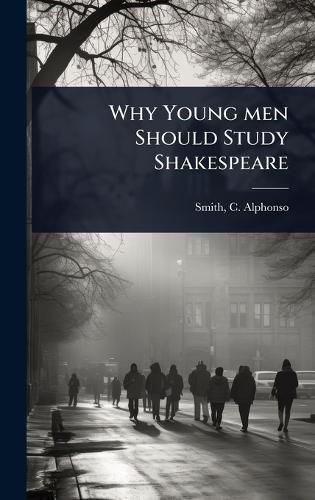Readings Newsletter
Become a Readings Member to make your shopping experience even easier.
Sign in or sign up for free!
You’re not far away from qualifying for FREE standard shipping within Australia
You’ve qualified for FREE standard shipping within Australia
The cart is loading…






In "Why Young Men Should Study Shakespeare," C. Alphonso Smith presents a compelling argument for the enduring value of Shakespearean study in shaping the character and intellect of young men. Published in 1902, this essay champions the Bard's works not merely as literary artifacts, but as vital tools for moral and intellectual development.
Smith elucidates how engagement with Shakespeare's plays fosters critical thinking, cultivates empathy, and provides invaluable insights into human nature. By exploring the complexities of Shakespeare's characters and plots, young men can refine their understanding of ethics, leadership, and the nuances of social interaction. This book makes a case for the importance of classical education in the modern era, reminding readers of the timeless wisdom found within Shakespeare's verse.
This work has been selected by scholars as being culturally important, and is part of the knowledge base of civilization as we know it. This work was reproduced from the original artifact, and remains as true to the original work as possible. Therefore, you will see the original copyright references, library stamps (as most of these works have been housed in our most important libraries around the world), and other notations in the work.
This work is in the public domain in the United States of America, and possibly other nations. Within the United States, you may freely copy and distribute this work, as no entity (individual or corporate) has a copyright on the body of the work.
As a reproduction of a historical artifact, this work may contain missing or blurred pages, poor pictures, errant marks, etc. Scholars believe, and we concur, that this work is important enough to be preserved, reproduced, and made generally available to the public. We appreciate your support of the preservation process, and thank you for being an important part of keeping this knowledge alive and relevant.
$9.00 standard shipping within Australia
FREE standard shipping within Australia for orders over $100.00
Express & International shipping calculated at checkout
In "Why Young Men Should Study Shakespeare," C. Alphonso Smith presents a compelling argument for the enduring value of Shakespearean study in shaping the character and intellect of young men. Published in 1902, this essay champions the Bard's works not merely as literary artifacts, but as vital tools for moral and intellectual development.
Smith elucidates how engagement with Shakespeare's plays fosters critical thinking, cultivates empathy, and provides invaluable insights into human nature. By exploring the complexities of Shakespeare's characters and plots, young men can refine their understanding of ethics, leadership, and the nuances of social interaction. This book makes a case for the importance of classical education in the modern era, reminding readers of the timeless wisdom found within Shakespeare's verse.
This work has been selected by scholars as being culturally important, and is part of the knowledge base of civilization as we know it. This work was reproduced from the original artifact, and remains as true to the original work as possible. Therefore, you will see the original copyright references, library stamps (as most of these works have been housed in our most important libraries around the world), and other notations in the work.
This work is in the public domain in the United States of America, and possibly other nations. Within the United States, you may freely copy and distribute this work, as no entity (individual or corporate) has a copyright on the body of the work.
As a reproduction of a historical artifact, this work may contain missing or blurred pages, poor pictures, errant marks, etc. Scholars believe, and we concur, that this work is important enough to be preserved, reproduced, and made generally available to the public. We appreciate your support of the preservation process, and thank you for being an important part of keeping this knowledge alive and relevant.